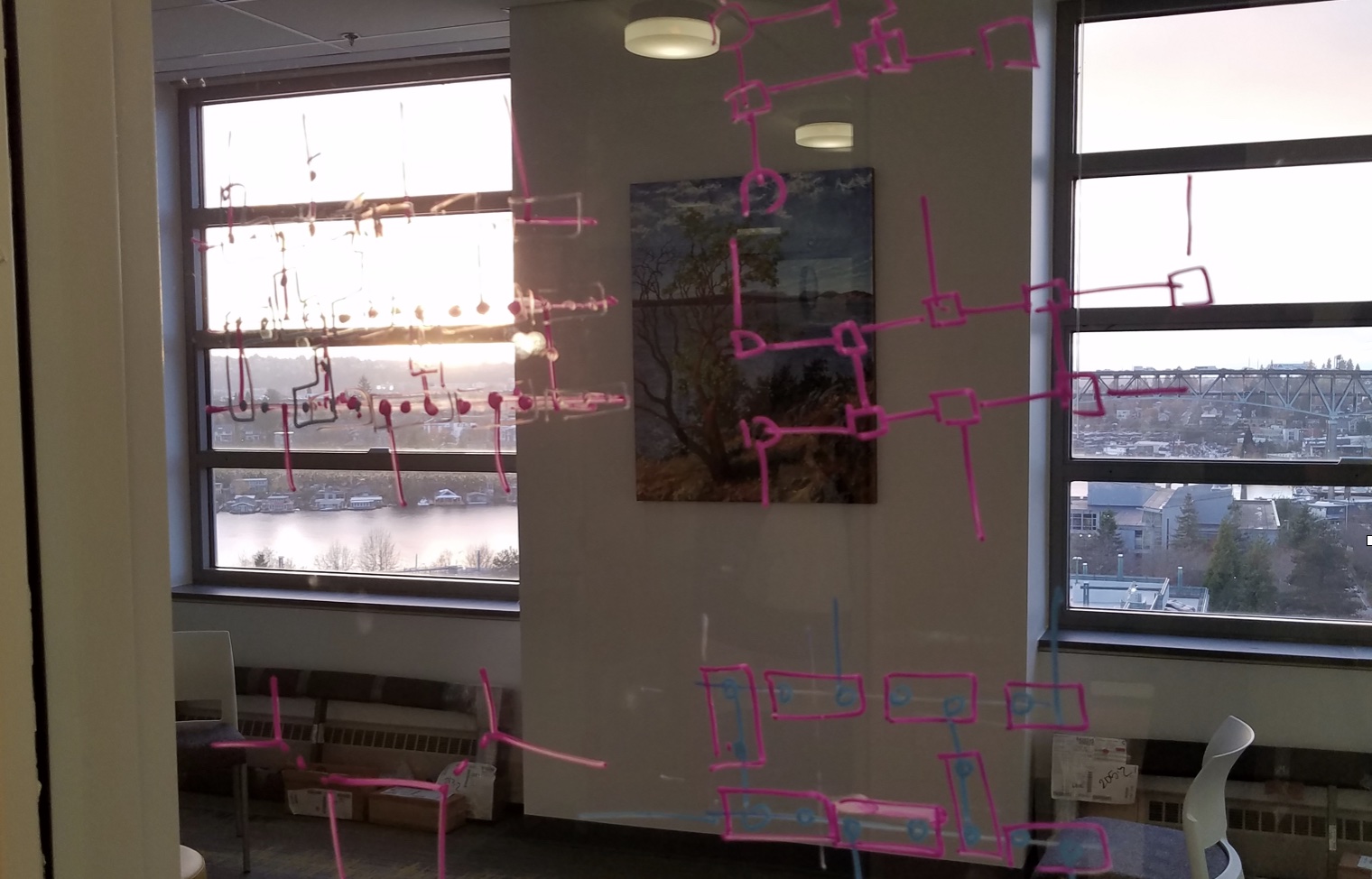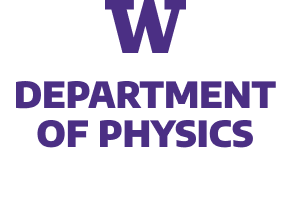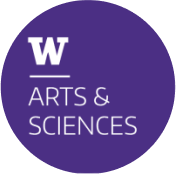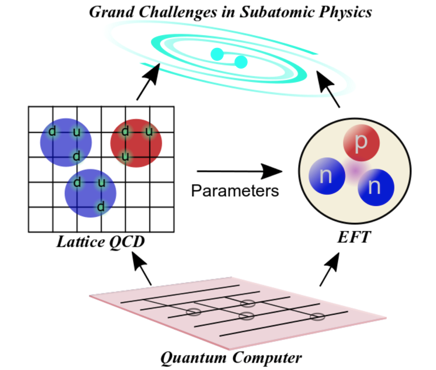
Next-Generation Computing for Low-Energy Nuclear Physics: from Machine Learning to Quantum Computing
Organizers: Zohreh Davoudi (U. of Maryland), Ubirajara van Kolck (U. of Arizona and Université Paris-Saclay), Silas Beane (UW), and Maria Piarulli (Washington U.)
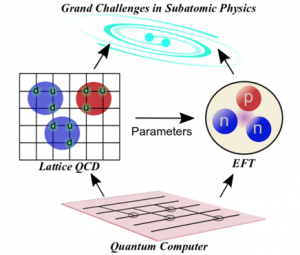
An important goal of modern nuclear physics is to accurately predict nuclear phenomena directly from quantum chromodynamics. One strategy to achieve this is to perform lattice QCD simulations of few-nucleon systems and match them to effective field theories, which in turn can serve as an input to “ab initio” many-body methods for computing nuclear properties. Both lattice QCD and ab initio many-body methods generally require beyond-exascale classical computation, and are expected to be facilitated by machine learning and quantum computing techniques. Ideas in quantum information science , such as the role of entanglement in nuclear processes, can impact our understanding of nuclear phenomena. Such approaches to computation will prove essential in advancing this critical area of the nuclear-physics mission in the coming decade.
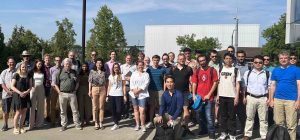
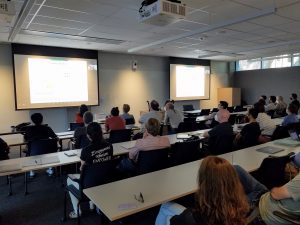
Hourly Schedule
Monday, August 15: Lattice QCD for nuclear physics: Theory and computing advances (including EFT matching and ML).
- 9.00am - 9.05am
- Introduction to the day. [Hans Rosling Center, room 135]
- Bira van Kolck (U of Arizona, Universite Paris-Saclay)
- 9.05am - 9.40am
- At the crossroad of LQCD, EFT, and few-body nuclear physics. [Hans Rosling Center, room 135]
- Nir Barnea (Hebrew University)
- 9.40am - 10.15M
- Machine learning for LQCD: Status, promises, and challenges [Hans Rosling Center, room 135]
- Boram Yoon (Los Alamos National Laboratory)
- 2.00pm - 2.15pm
- Challenges and progress in multi-nucleon calculations with LQCD [6th Floor Physics]
- Takeshi Yamazaki (University of Tsukuba)
- 2.15pm - 2.30pm
- Highlight of recent LQCD calculations of nuclear forces and matrix elements [6th Floor Physics]
- Marc Illa (IQuS/University of Washington)
- 2.30pm - 3.15pm
- Discussion [6th Floor Physics]
- Leads: Thomas Papenbrock (Oak Ridge National Laboratory), Xilin Zhang (FRIB/Michigan State University) (tbc); Moderator: Bira van Kolck (U of Arizona, Universite Paris-Saclay)
Tuesday, August 16: Lattice QCD in the era of quantum computing
- 9.00am - 9.05am
- Introduction to the day [Hans Rosling Center, room 135]
- Zohreh Davoudi (University of Maryland, College Park)
- 9.05am - 9.40am
- Progress in quantum computing non-Abelian lattice gauge theories [Hans Rosling Center, room 135]
- Natalie Klco (Duke University)
- 9.40am - 10.15am
- Analog quantum simulators for gauge theories: Hamiltonian engineering, symmetry protection, and all that (Remote talk) [Hans Rosling Center, room 135]
- Jad Halimeh (LMU-Munich)
- 2.00pm - 2.15pm
- Non-equilibrium QCD with quantum computers? [6th Floor Physics]
- Niklas Mueller (University of Maryland, College Park)
- 2.15pm - 2.30pm
- The significance of efficient representation of gauge theories in quantum simulation [6th Floor Physics]
- Dorota Grabowska (CERN)
- 2.30pm - 3.15pm
- Discussion [6th Floor Physics]
- Leads: Doug Beck (University of Illinois, Urbana Champaign), Martin Savage (IQuS/University of Washington); Moderator: Zohreh Davoudi (University of Maryland, College Park)
Wednesday, August 17: Nuclear many-body physics: Theory and computing advances (including ML)
- 9.00am - 9.05am
- Introduction to the day [Hans Rosling Center, room 135]
- Maria Piarulli (Washington University, St. Louis)
- 9.05am - 9.40am
- Emulator technology and statistical tools in ab-initio nuclear physics [Hans Rosling Center, room 135]
- Andreas Ekstrom (Chalmers University)
- 9.40am - 10.15am
- Machine learning for nuclear many-body physics: Status, promises, and challenges [Hans Rosling Center, room 135]
- Alessandro Lovato (Argonne National Laboratory)
- 2.00pm - 2.15pm
- Highlight of recent computational advances and challenges in neutrino-nucleus scattering [6th Floor Physics]
- Joe Carlson (Los Alamos National Laboratory)
- 2.15pm - 2.30pm
- Deep learning to investigate static properties of light nuclei [6th Floor Physics]
- James Vary (Iowa State University)
- 2.30pm - 3.15pm
- Discussion [6th Floor Physics]
- Leads: Dean Lee (FRIB/Michigan State University) , Thomas Papenbrock (Oak Ridge National Laboratory) ; Moderator: Maria Piarulli (Washington University, St. Louis)
Thursday, August 18: Nuclear many-body physics in the era of quantum computing
- 9.00am - 9.05am
- Introduction to the day [Hans Rosling Center, room 135]
- Martin Savage (IQuS/University of Washington)
- 9.05am - 9.40am
- Nuclear dynamics with quantum computers? [Hans Rosling Center, room 135]
- Alessandro Roggero (University of Trento)
- 9.40am - 10.15am
- Preparation of ground and excited nuclear states on a quantum computer [Hans Rosling Center, room 135]
- Alessandro Baroni (Los Alamos National Laboratory)
- 2.00pm - 2.15pm
- Quantum algorithms for nuclear effective field theories [6th Floor Physics]
- James Watson (University of Maryland, College Park)
- 2.15pm - 2.30pm
- Quantum-hardware co-design for simulating nuclear interactions [6th Floor Physics]
- Kyle Wendt (Lawrence Livermore National Laboratory)
- 2.30pm - 3.15pm
- Discussion [6th Floor Physics]
- Leads: Francesco Pederiva (University of Trento), Joe Carlson (Los Alamos National Laboratory) (tbc); Moderator: Martin Savage (IQuS/University of Washington)
Friday, August 19: The role of quantum entanglement in nuclear physics
- 9.00am - 9.05am
- Introduction to the day [Hans Rosling Center, room 135]
- Silas Beane (University of Washington)
- 9.05am - 9.40am
- Entanglement in quantum field theories [Hans Rosling Center, room 135]
- Doug Beck (University of Illinois, Urbana Champaign)
- 9.40am - 9.55am
- Entanglement in hadronic physics [Hans Rosling Center, room 135]
- Martin Savage (IQuS/University of Washington)
- 9.55amm - 10.10am
- Entanglement in nuclear few-body physics [Hans Rosling Center, room 135]
- Caroline Robin (GSI/Universität Bielefeld)
- 10.10am - 10.15am
- BREAK
- 10.15am - 11.00am
- Discussion [Hans Rosling Center, room 135]
- Lead: Dean Lee (FRIB/Michigan State University) ; Moderator: Silas Beane (University of Washington)
